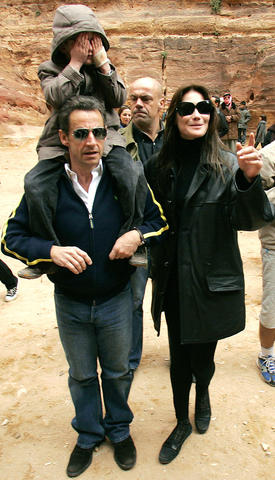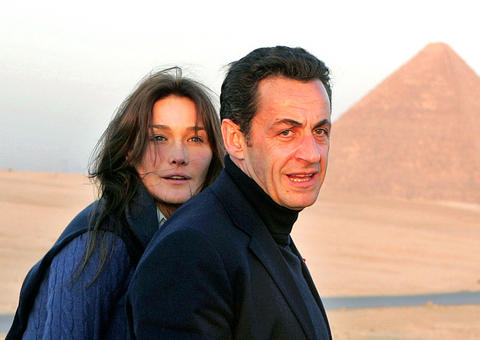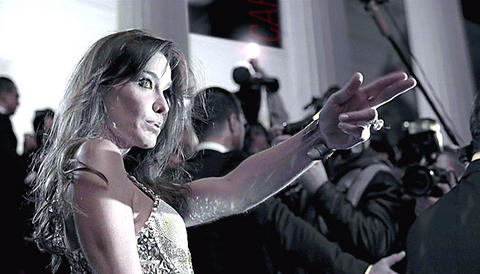Carla Bruni, the Italian ex-supermodel turned folk-singer, is madly, passionately, giddily in love with French President Nicolas Sarkozy. "She blushes when he comes into the room," says a friend. When she's not with him and the camera crews she is admiring him from afar. "She's very happy," says Colombe Pringle, who has known Bruni since editing French Vogue in the 1990s. "When Sarkozy announced the prospect of marriage during his new year's press conference, I called her to congratulate her while he was still speaking. She said: 'I'm sitting here watching the president on TV. He's amazing.'"
Sarkozy, France's hyperactive, workaholic, political-showman leader, revels in his nickname "Speedy." So it is not surprising that he does not subscribe to slow romance. In October, he reluctantly divorced Cecilia, the bolshy, cheating, rebellious love of his life. In November, he was still devastated, pining and insisting on wearing his wedding ring. Last month, he fell madly in love with Bruni, a younger spitting image of Cecilia, a week after meeting her. At Christmas, they exchanged US$124,000 worth of jewelry and watches as love tokens. By the end of this month, two months after they first set eyes on each other, Bruni is expected to have become his third wife. The left-wing, libertine ex-model, who believes in free love and whose exes include Mick Jagger, Eric Clapton and Donald Trump, will be the new first lady of France.
The Sarkozy-Bruni public showbiz-romance has already been slammed as vulgar, undignified and unFrench. A quick marriage is seen as the only solution to France's collective embarrassment. But who is Bruni and what awaits her as premiere dame? When Sarkozy's wife Cecilia demanded a divorce and walked out last year, it was a sea-change: From now on, a premiere dame could be modern, no longer a submissive wife. Yet in reality, the job is still steeped in tradition and public opinion can easily turn. All French first ladies are at some point scathingly compared to that unfortunate, loathed fashion victim, Marie Antoinette. With Bruni and Sarkozy's expensive tastes, and Bruni's foreign roots, this comparison is potentially more damaging than ever before. Sarkozy has been likened to a hedonistic monarch who offers up his romantic escapades as entertainment to distract the people from their miserable salaries and economic gloom. Bruni likes to throw parties with him in his lavish retreat in the grounds of the palace of Versailles. As the marriage preparations continue, she should be wary of a revolution.

PHOTO: AFP
Carla Bruni-Tedeschi, 39, is a millionaire Italian heiress whose high bourgeois upbringing was far more glamorous and moneyed than Sarkozy's. She grew up believing she was the daughter of the Italian tire magnate and classical composer Alberto Bruni-Tedeschi and the Italian concert pianist Marysa Borini. Years later, her parents told her she was really the fruit of her mother's affair with a violinist 13 years younger, but that, knowing this, Bruni-Tedeschi had raised her as his own. When she was five, the family fled from Turin to France to escape a wave of kidnappings and killings of right-wing politicians and businessmen by Italy's left-wing Red Brigades. As a child, she and her two older siblings were used to bodyguards, palaces and famous friends. The Bruni-Tedeschis lived between Paris and their southern estate on the Cote d'Azur, near the presidential retreat, the fort of Bregancon. Bruni's mother, always keen for her children to make connections, wanted them to befriend the Grimaldi children, Albert, Caroline and Stephanie of Monaco. When Bruni was a teenager, the family traveled back and forth to their Piedmontese castle near Turin, where they showed off their art collection.
Bruni, who went to a Swiss finishing school and briefly studied art before quitting, did not need the money when she embarked on the modeling career that saw her become one of the highest-paid supermodels of the 1990s. The face of Versace and Guess Jeans, she earned US$7.5 million a year at the height of her fame. "She wasn't starry, she was like any other model," says a designer at a French fashion house. But Bruni enjoyed a power over men that would ensure her shift from the cover of Vogue to the front page of the Sun. At 22, she began an affair with Mick Jagger, then aged 48. Jagger reportedly rushed to an exotic holiday with Bruni within 24 hours of his wife Jerry Hall giving birth to their third child. The affair would spark a public slanging match between Bruni and Hall and contribute to the Jaggers' divorce. Other men who fell for Bruni included Eric Clapton, Donald Trump, former socialist French prime minister Laurent Fabius and Arno Klarsfeld, a suave Paris lawyer and friend of Sarkozy's. She left the publisher and novelist Jean-Paul Enthoven for his 26-year-old philosopher son, Raphael, with whom she had a son, now six. She was then immortalized as a cold and calculating man-eater in a scathing fictional account by Raphael's novelist ex-wife, Justine Levy (the daughter of the philosopher Bernard-Henri Levy).
"With regards to men, it's not love that drives her - it's something else, but definitely not love," says one French celebrity who knew her exes. Bruni has been open about her attitude to free love. "I am a tamer of men, a cat, an Italian," she told Le Figaro last year. "Monogamy bores me terribly ... . I am monogamous from time to time but I prefer polygamy and polyandry [its female equivalent]." She could become the first French first lady who is open about her own sexual appetite rather than having to devote a life to hiding her husband's.

PHOTO: AP
By last winter, Bruni was living a comfortable life as a single mother in Paris's chic 16th arrondissement, long separated from Raphael Enthoven. In 2002, she had found huge success in France with her first folk-pop album, Quelqu'un m'a dit (Someone Told Me). But last year, No Promises, her English-language follow-up, flopped. Bruni was known as a left-winger who backed liberal causes and supported the socialist Segolene Royal against the unashamedly right-wing Nicolas Sarkozy in the presidential election.
Then, at the end of November, everything changed. Sarkozy, 52, was alone at the Elysee Palace a month after Cecilia divorced him. As when Cecilia had left him before in 2005, Sarkozy did not like being on his own. A teetotaler who is normally asleep by midnight, he went out with pop stars and celebrity friends for karaoke until 4am. And, as before, he called friends, asking them to arrange dinners in his honor. One of these was Jacques Seguela, an advertising guru famed for creating Francois Mitterrand's campaigns of the 1980s and a member of Paris's left-wing intelligentsia. Seguela explained: "He said: 'Invite me to dinner with your gang. I can't face any more evenings alone at the Elysee Palace.' He was very low."
Bruni, who had never met Sarkozy before, was one of the guests. The president escorted her home and took her phone number. Weeks later, he told the nation he was seriously in love.

PHOTO AFP
But, to the public's alarm, the specter of Sarkozy's ex-wife was clear for everyone to see. Bruni looks uncannily like a younger version of Cecilia. Like his ex-wife, she is taller than Sarkozy, obliged to wear the same flat shoes while he wears stack-heeled slip-ons. The president bought Bruni the same Dior ring that Cecilia was wearing earlier this year, took her to the same haunts and flew her to Jordan - the fated spot where, in 2005, Cecilia first appeared with her lover Richard Attias, publicly cuckolding Sarkozy.
"I think it's absolutely incredible that this man, who did everything to prevent his divorce, who painfully loved Cecilia and spent years trying to keep her, should totally by chance immediately fall in love with a woman who looks exactly like her - whose name begins with C and ends in A and whom he takes to Disneyland, where he and Cecilia used to go all the time with their kids," says Catherine Nay, Sarkozy's biographer, who knows the president's family well. "From a psychoanalytical point of view, it's staggering. Maybe it's sincere and this is a real, solid love affair. But psychoanalysis shows us that it's possible to repeat situations, even unconsciously, to recreate a kind of continuity."
France awaits the promised wedding - Sarkozy's third and Bruni's first - and the new couple's attitude to protocol. The role of French president's wife is not as formal as America's first lady, but Bruni will be expected to embody elegance and dignity at official dinners and state visits. She will also have to continue the charity work of her predecessors.

PHOTO: EPA
"I think there will be a first phase after the marriage where the fairytale will continue and the French will admire her for her official role. She will appear at functions wearing haute couture. That will go very well if the couple avoid falling into excess, if they are elegant and not too bling-bling," says Christophe Barbier, editor of the news weekly L'Express and a close friend of Bruni's for seven years. "The second phase will be when she takes up her full role."
He describes Bruni, who is currently recording her next album, as "extremely simple, normal and humble - not a star and not a diva. She is very like a teenager in her enthusiasms. She is very curious and likes debating, taking up causes that she falls in love with. She's a northern Italian, she's not Mediterranean, but she's Italian all the same; there's a lot of fire there."
Christine Clerc, an expert on French first-lady protocol, warns that there is no precedent for a French president marrying into the world of showbiz. "We reproached Marie Antoinette for her clothes and lifestyle, but what if she had been an actress? I think our judgment would have been different. Now we have a mixture of the two, it will be very interesting to see how we judge Bruni. Will we be lax or more demanding?"

On the final approach to Lanshan Workstation (嵐山工作站), logging trains crossed one last gully over a dramatic double bridge, taking the left line to enter the locomotive shed or the right line to continue straight through, heading deeper into the Central Mountains. Today, hikers have to scramble down a steep slope into this gully and pass underneath the rails, still hanging eerily in the air even after the bridge’s supports collapsed long ago. It is the final — but not the most dangerous — challenge of a tough two-day hike in. Back when logging was still underway, it was a quick,

From censoring “poisonous books” to banning “poisonous languages,” the Chinese Nationalist Party (KMT) tried hard to stamp out anything that might conflict with its agenda during its almost 40 years of martial law. To mark 228 Peace Memorial Day, which commemorates the anti-government uprising in 1947, which was violently suppressed, I visited two exhibitions detailing censorship in Taiwan: “Silenced Pages” (禁書時代) at the National 228 Memorial Museum and “Mandarin Monopoly?!” (請說國語) at the National Human Rights Museum. In both cases, the authorities framed their targets as “evils that would threaten social mores, national stability and their anti-communist cause, justifying their actions

In the run-up to World War II, Admiral Wilhelm Canaris, head of Abwehr, Nazi Germany’s military intelligence service, began to fear that Hitler would launch a war Germany could not win. Deeply disappointed by the sell-out of the Munich Agreement in 1938, Canaris conducted several clandestine operations that were aimed at getting the UK to wake up, invest in defense and actively support the nations Hitler planned to invade. For example, the “Dutch war scare” of January 1939 saw fake intelligence leaked to the British that suggested that Germany was planning to invade the Netherlands in February and acquire airfields

The launch of DeepSeek-R1 AI by Hangzhou-based High-Flyer and subsequent impact reveals a lot about the state of the People’s Republic of China (PRC) today, both good and bad. It touches on the state of Chinese technology, innovation, intellectual property theft, sanctions busting smuggling, propaganda, geopolitics and as with everything in China, the power politics of the Chinese Communist Party (CCP). PLEASING XI JINPING DeepSeek’s creation is almost certainly no accident. In 2015 CCP Secretary General Xi Jinping (習近平) launched his Made in China 2025 program intended to move China away from low-end manufacturing into an innovative technological powerhouse, with Artificial Intelligence